Dialysis is a life-saving treatment for those with chronic kidney disease (CKD) or end-stage renal disease (ESRD). While dialysis helps filter waste and excess fluids from the blood when the kidneys can no longer perform these tasks, it’s crucial for patients to adopt certain practices to maintain their health and improve their quality of life.
As a nephrologist, I have seen many patients thrive when they follow key guidelines in their daily routines. Here are some important do’s and don’ts for dialysis patients that can help make treatment more effective and prevent complications.
Do’s for Dialysis Patients
- Do Follow Your Prescribed Treatment Schedule Dialysis is designed to mimic the function of healthy kidneys, but it can only do so effectively if you stick to your prescribed treatment schedule. Missing or shortening sessions can lead to toxin buildup in your body, causing fatigue, weakness, or more serious complications.
- Do Maintain a Balanced Diet Your diet plays a critical role in managing your health. Dialysis patients often need to follow specific dietary restrictions to help manage fluid and electrolyte balance. Key tips include:
- Limit potassium, sodium, and phosphorus: Foods rich in potassium (bananas, potatoes), sodium (processed foods), and phosphorus (dairy, nuts) should be limited.
- Choose high-quality proteins: Incorporate lean proteins such as chicken, fish, or plant-based options as recommended by your dietitian.
- Control fluid intake: Since your kidneys can’t remove excess fluid, it’s essential to follow your doctor’s guidance on how much water and fluid you can safely consume.
- Do Stay Active Light to moderate exercise, such as walking, swimming, or yoga, can help improve circulation, enhance your overall well-being, and maintain muscle strength. Always consult with your doctor before starting any exercise program.
- Do Keep an Eye on Your Vascular Access Your vascular access is your lifeline for dialysis, so it’s important to take care of it. Regularly check for any signs of infection, such as redness, swelling, or warmth at the site. Keep the area clean, and avoid carrying heavy objects or putting pressure on the access site.
- Do Monitor Your Blood Pressure and Weight Blood pressure and weight fluctuations can indicate fluid retention or other issues that need attention. Regular monitoring at home and sharing these readings with your healthcare provider can help manage your treatment plan more effectively.
- Do Stay Positive and Connected Dialysis can be challenging, but staying mentally strong is essential. Join support groups, connect with others undergoing similar treatments, and seek counseling if needed. Mental health is as important as physical health in managing chronic conditions.
Don’ts for Dialysis Patients
- Don’t Skip Medications Your medications are a critical part of managing your condition. Whether it’s medication to control blood pressure, manage phosphorus levels, or prevent fluid buildup, take them exactly as prescribed by your doctor. Skipping medications can lead to serious complications.
- Don’t Overindulge in Fluids One of the biggest challenges for dialysis patients is controlling fluid intake. Overconsumption of fluids can lead to swelling, high blood pressure, and difficulty breathing. Follow the fluid limits provided by your healthcare team, and be cautious about “hidden” fluids in foods like soups or fruits.
- Don’t Ignore Changes in Your Health If you experience unusual symptoms such as nausea, vomiting, breathing difficulties, or changes in your urine output, alert your healthcare provider immediately. These may indicate complications that need urgent attention.
- Don’t Eat High-Potassium or High-Phosphorus Foods Dialysis patients must be mindful of certain minerals in their diets. High potassium levels can cause heart issues, while excess phosphorus can lead to bone and joint problems. Stay away from foods like oranges, tomatoes, bananas, dairy products, and nuts unless cleared by your dietitian.
- Don’t Smoke or Drink Excessive Alcohol Smoking and heavy alcohol consumption can worsen kidney function, cause cardiovascular issues, and increase the risk of infection. Quitting smoking and limiting alcohol intake are essential steps toward better health.
- Don’t Forget About Emotional Well-being Dialysis can be emotionally draining. Don’t hesitate to ask for support when you need it. Whether it’s talking to friends, family, or a professional counselor, maintaining emotional well-being is crucial for your overall health.
Best Practices for Dialysis Patients
To optimize your health and well-being while on dialysis, incorporate these best practices into your daily routine:
- Communicate Regularly with Your Healthcare Team: Keep your nephrologist informed about any changes in your health, diet, or lifestyle. Regular communication ensures that your treatment plan is adjusted as needed.
- Attend All Follow-Up Appointments: These visits are vital for assessing your kidney function, monitoring for complications, and ensuring your treatment is progressing as planned.
- Adopt Healthy Habits: Focus on building a balanced lifestyle that includes a healthy diet, regular physical activity, and stress management techniques like meditation or deep breathing exercises.
- Engage in Self-Care: Dialysis can be demanding, but self-care is essential. Find time to relax, pursue hobbies, and engage in activities that bring joy and peace.
Conclusion
Dialysis is a crucial treatment for kidney failure, and with the right precautions, you can lead a healthier, more fulfilling life. By following these do’s and don’ts, you can enhance the effectiveness of your treatment, prevent complications, and improve your quality of life.
Always remember, each patient’s journey is unique. For personalized advice, consult your nephrologist or healthcare team. Together, you can create a tailored care plan that supports your health and well-being throughout your dialysis treatment.

Leave a Reply